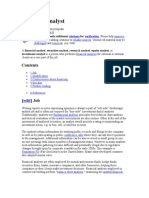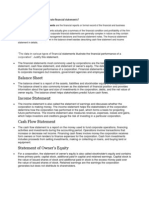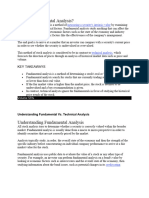0 ratings0% found this document useful (0 votes)
11 viewsHow Does Analysts' Forecast Quality Relate To Corporate Investment Efficiency?
How Does Analysts' Forecast Quality Relate To Corporate Investment Efficiency?
Uploaded by
Thu ThuThis document discusses how analysts' forecast quality relates to corporate investment efficiency. It presents two hypotheses: 1) That analysts' forecast quality is positively associated with investment efficiency by reducing information asymmetry and acting as monitors of management. 2) That analysts' forecast quality puts pressure on managers, which could lead to short-term behaviors and suboptimal investments. The document provides background on issues like principal-agent conflicts, adverse selection, and the roles of analysts in disseminating information and monitoring firms.
Copyright:
© All Rights Reserved
Available Formats
Download as DOCX, PDF, TXT or read online from Scribd
How Does Analysts' Forecast Quality Relate To Corporate Investment Efficiency?
How Does Analysts' Forecast Quality Relate To Corporate Investment Efficiency?
Uploaded by
Thu Thu0 ratings0% found this document useful (0 votes)
11 views2 pagesThis document discusses how analysts' forecast quality relates to corporate investment efficiency. It presents two hypotheses: 1) That analysts' forecast quality is positively associated with investment efficiency by reducing information asymmetry and acting as monitors of management. 2) That analysts' forecast quality puts pressure on managers, which could lead to short-term behaviors and suboptimal investments. The document provides background on issues like principal-agent conflicts, adverse selection, and the roles of analysts in disseminating information and monitoring firms.
Original Description:
Original Title
Eco_Nguyễn-Bảo-Ngọc
Copyright
© © All Rights Reserved
Available Formats
DOCX, PDF, TXT or read online from Scribd
Share this document
Did you find this document useful?
Is this content inappropriate?
This document discusses how analysts' forecast quality relates to corporate investment efficiency. It presents two hypotheses: 1) That analysts' forecast quality is positively associated with investment efficiency by reducing information asymmetry and acting as monitors of management. 2) That analysts' forecast quality puts pressure on managers, which could lead to short-term behaviors and suboptimal investments. The document provides background on issues like principal-agent conflicts, adverse selection, and the roles of analysts in disseminating information and monitoring firms.
Copyright:
© All Rights Reserved
Available Formats
Download as DOCX, PDF, TXT or read online from Scribd
Download as docx, pdf, or txt
0 ratings0% found this document useful (0 votes)
11 views2 pagesHow Does Analysts' Forecast Quality Relate To Corporate Investment Efficiency?
How Does Analysts' Forecast Quality Relate To Corporate Investment Efficiency?
Uploaded by
Thu ThuThis document discusses how analysts' forecast quality relates to corporate investment efficiency. It presents two hypotheses: 1) That analysts' forecast quality is positively associated with investment efficiency by reducing information asymmetry and acting as monitors of management. 2) That analysts' forecast quality puts pressure on managers, which could lead to short-term behaviors and suboptimal investments. The document provides background on issues like principal-agent conflicts, adverse selection, and the roles of analysts in disseminating information and monitoring firms.
Copyright:
© All Rights Reserved
Available Formats
Download as DOCX, PDF, TXT or read online from Scribd
Download as docx, pdf, or txt
You are on page 1of 2
How does analysts' forecast quality relate to corporate
investment efficiency?
Related literature and hypothesis development
1.Management incentives, availability of capital, and investment efficiency:
The reasons for the ineffective investment may be due to the conflict of interest
between management and shareholders and the main constraints faced by the
company. The negative impact of moral hazard and the problem of adverse
selection for the investment efficiency can be reduced by improving the
information environment of the company and effective monitoring is done by
shareholders, financial institutions and other stakeholders.
*The adverse selection problem: When the company's insider ownership
information superiority on the real value of the company and have the incentive
to release capital is too high or issued capital when the company was
overvalued. However, with limited information, external capital suppliers can
be suspicious and respond by increasing the company's external financial costs.
The problem of adverse selection not only affects equity financing, but also debt
financing, for which lenders, who possess less information than borrowers, will
require a higher cost of debt that squeezes out “good borrowers”.
*The principal-agent conflict or moral hazard problem: most of this is due to the
difference between managerial incentives and shareholder interests. Instead of
enriching shareholders, managers have other privacy goals, arrogance and
inconsistency of managers and thus lead to inefficient investments.
2. Analyst forecast quality and investment level: Information intermediary and
monitoring agent review : A timely and transparent information environment
and an effective monitoring mechanism can help prevent managers from
making investment decisions that deviate from the optimal level, and that is also
the function of analysts. There is a large body of literature documenting the
roles of financial analysts as intermediaries of information between companies
and investors.
*Financial analysts have an information advantage by providing both public and
private information to individuals and institutional investors.
*Financial analyst forecasts help minimize information asymmetry between
insiders of the company and external capital suppliers and between managers
and shareholders.
*Expert analysis from external analysts is expected to play a monitoring role
that helps to increase the investment efficiency of firms by constraining
management from making suboptimal investments and reducing firms' cost of
capital.
Based on the above views, we hypothesize that, analyst forecasts provide
valuable information on and monitor firms' investment activities, leading to
higher investment efficiency of firms. Specifically, we expect that the quality of
analyst earnings forecasts help to reduce over- and under-investment by firms
and we form the following hypothesis:
+analysts' forecast quality is positively associated with investment efficiency
+analysts' forecast quality is negatively associated with investment efficiency.
3. Analyst forecast quality and investment level: market pressure view
When stock prices fall and do not meet market expectations, the managers of
these companies experience reduced compensation, , a greater likelihood of
turnover and loss of reputation. Therefore, analysts are expected to put pressure
on regulators or defeat income standards, which could give rise to adverse
effects such as short-termism and behavior opportunity
You might also like
- Honda Accord 2003 2008 Workshop ManualDocument22 pagesHonda Accord 2003 2008 Workshop Manualnaluhywe100% (16)
- The Role of Capital Market Intermediaries in The Dot-Com Crash of 2000Document5 pagesThe Role of Capital Market Intermediaries in The Dot-Com Crash of 2000Prateek Jain100% (3)
- Summary Paper Armstrong Et Al. (2010)Document7 pagesSummary Paper Armstrong Et Al. (2010)Carlijn SchiphorstNo ratings yet
- FinmanDocument3 pagesFinmanyechue67% (6)
- GRC Test BankDocument123 pagesGRC Test Bankshams319100% (9)
- Syllabus Portfolio AUNDocument6 pagesSyllabus Portfolio AUNThu ThuNo ratings yet
- A Framework For Business Analysis and Valuation Using Financial StatementsDocument10 pagesA Framework For Business Analysis and Valuation Using Financial Statementsblue_15No ratings yet
- DocxDocument7 pagesDocxHeni OktaviantiNo ratings yet
- Business Analysis and Valuation Capitulo 01Document32 pagesBusiness Analysis and Valuation Capitulo 01Leonardo Martínez ViverosNo ratings yet
- Analysis and Uses of Financial StatementsDocument144 pagesAnalysis and Uses of Financial StatementsPepe ArriagaNo ratings yet
- Indore Institute of Law: (Affiliated To D.A.V.V. & BCI)Document6 pagesIndore Institute of Law: (Affiliated To D.A.V.V. & BCI)SARIKANo ratings yet
- Meaning of RatioDocument3 pagesMeaning of RatioVishnu VamshiNo ratings yet
- Mama MoDocument3 pagesMama MoJoshua Louis RacelisNo ratings yet
- Topic 1 A Framework For Business Analysis and ValuationDocument26 pagesTopic 1 A Framework For Business Analysis and Valuationfacescrubs.lkNo ratings yet
- Module 2 Relationship of Financial Objectives To Organizational Study and ObjectivesDocument4 pagesModule 2 Relationship of Financial Objectives To Organizational Study and ObjectivesSofia YuNo ratings yet
- Article Review and ConclusionDocument2 pagesArticle Review and ConclusionHogo DewenNo ratings yet
- Title: Lending and Investing Framework and Its Relevance To A Corporate EntityDocument3 pagesTitle: Lending and Investing Framework and Its Relevance To A Corporate Entitykalaimani25No ratings yet
- Do State and Foreign Ownership Affect Investment Efficiency? Evidence From PrivatizationsDocument2 pagesDo State and Foreign Ownership Affect Investment Efficiency? Evidence From PrivatizationsThu ThuNo ratings yet
- Mandatory and Voluntary Disclosure On Annual ReportDocument3 pagesMandatory and Voluntary Disclosure On Annual ReportKhanh LeNo ratings yet
- Untitled DocumentDocument5 pagesUntitled DocumentTrần Thị Phương LinhNo ratings yet
- Unit Iv: Financing DecisionsDocument11 pagesUnit Iv: Financing DecisionsAR Ananth Rohith BhatNo ratings yet
- Capital StructureDocument10 pagesCapital StructurevandanadilipkamathNo ratings yet
- Chapter 1 - InesDocument5 pagesChapter 1 - InesDardan BalajNo ratings yet
- The Importance of Financial Statements For Investment Decision MakingDocument4 pagesThe Importance of Financial Statements For Investment Decision MakingYusra AmeenNo ratings yet
- Answers To Review QuestionsDocument5 pagesAnswers To Review QuestionsMaria ArshadNo ratings yet
- Sutherland Research - Fund Managers Minute Post #3 - In-Sourcing of Asset Management. Are Institutional Investors Ready - Part 2Document3 pagesSutherland Research - Fund Managers Minute Post #3 - In-Sourcing of Asset Management. Are Institutional Investors Ready - Part 2vikas0707No ratings yet
- The Economic and Institutional Setting For Financial ReportingDocument48 pagesThe Economic and Institutional Setting For Financial Reportingcatelyne santosNo ratings yet
- Designing A Capital StructureDocument16 pagesDesigning A Capital StructureDHARMA DAZZLE100% (1)
- Financial AnalystDocument3 pagesFinancial AnalystRohit BhandariNo ratings yet
- Organization Structure of Agro-Know1111Document4 pagesOrganization Structure of Agro-Know1111irfanaliNo ratings yet
- Financial Ratio Analysis of Firms A ToolDocument6 pagesFinancial Ratio Analysis of Firms A ToolمريمالرئيسيNo ratings yet
- Financial GoalsDocument7 pagesFinancial GoalsDhwani MehtaNo ratings yet
- Im Unit-2Document18 pagesIm Unit-2jeeshanbhavikatti09No ratings yet
- Activist Investing White Paper by Florida State Board of AdmistrationDocument48 pagesActivist Investing White Paper by Florida State Board of AdmistrationBradley TirpakNo ratings yet
- Balance Sheet: What Do You Mean by Corporate Financial Statements?Document3 pagesBalance Sheet: What Do You Mean by Corporate Financial Statements?maabachaNo ratings yet
- Final ProjectDocument55 pagesFinal ProjectAnjan KumarNo ratings yet
- FM Mod 4Document12 pagesFM Mod 4Supriya CSNo ratings yet
- Financial DistressDocument5 pagesFinancial DistresspalkeeNo ratings yet
- Accct 1Document4 pagesAccct 1Jael AlmazanNo ratings yet
- AnswerDocument20 pagesAnswerVinod ChavhanNo ratings yet
- Financial Performance Analysis - ICICIDocument6 pagesFinancial Performance Analysis - ICICIkhayyumNo ratings yet
- A Project On Capital StructureDocument62 pagesA Project On Capital StructurejagadeeshNo ratings yet
- Security Analysis Topic9Document16 pagesSecurity Analysis Topic9Kaushali WeerakkodyNo ratings yet
- CFDocument15 pagesCFmauryaveer11No ratings yet
- Ch10 Monitoring and ControlDocument7 pagesCh10 Monitoring and ControlchristineNo ratings yet
- INVESTMENT ANALYSIS RagaviDocument43 pagesINVESTMENT ANALYSIS Ragavigkvimal nathanNo ratings yet
- F8 Audit and Assurance 2011 Int CLEANDocument281 pagesF8 Audit and Assurance 2011 Int CLEANFahmi Abdulla100% (1)
- CHAPTER 6hshshsWPS OfficeDocument78 pagesCHAPTER 6hshshsWPS OfficeKris Van HalenNo ratings yet
- TM 8: Mid Term Test Tm9: Stakeholder'S Roles and ResponsibilityDocument18 pagesTM 8: Mid Term Test Tm9: Stakeholder'S Roles and ResponsibilitysharaNo ratings yet
- Oneliners P6Document8 pagesOneliners P6Nirvana BoyNo ratings yet
- Finma Midterm ReviewerDocument34 pagesFinma Midterm ReviewerZail Jeff DaleNo ratings yet
- Module 6 FINP1 Financial ManagementDocument28 pagesModule 6 FINP1 Financial ManagementChristine Jane LumocsoNo ratings yet
- Chapter 2 - Theoretical Basis and Literature Review 2.1 Theoretical Basis 1. Agency TheoryDocument6 pagesChapter 2 - Theoretical Basis and Literature Review 2.1 Theoretical Basis 1. Agency TheoryConnie ChristinaNo ratings yet
- Accounting For ManagementDocument186 pagesAccounting For ManagementprofdrnrkNo ratings yet
- Chapter 1 Overview of The Financial SystemDocument19 pagesChapter 1 Overview of The Financial SystemMiller RilleyNo ratings yet
- Fundamental AnalysisDocument6 pagesFundamental AnalysisMuhammad JunaidNo ratings yet
- 302 Previous QuestionDocument22 pages302 Previous Questionmd. hasan.No ratings yet
- Critical Financial Review: Understanding Corporate Financial InformationFrom EverandCritical Financial Review: Understanding Corporate Financial InformationNo ratings yet
- Summary of Michael J. Mauboussin & Alfred Rappaport's Expectations InvestingFrom EverandSummary of Michael J. Mauboussin & Alfred Rappaport's Expectations InvestingNo ratings yet
- Ethical Valuation: Navigating the Future of Startup InvestmentsFrom EverandEthical Valuation: Navigating the Future of Startup InvestmentsNo ratings yet
- Excel Bav Vinamilk C A 3 Chúng TaDocument47 pagesExcel Bav Vinamilk C A 3 Chúng TaThu ThuNo ratings yet
- Gamuda Land (HCMC) Joint Stock Company: TO: Gamuda Land (HCMC) JSC 68 N1 Street, Son Ky Ward District HCMC, VietnamDocument2 pagesGamuda Land (HCMC) Joint Stock Company: TO: Gamuda Land (HCMC) JSC 68 N1 Street, Son Ky Ward District HCMC, VietnamThu ThuNo ratings yet
- BMP Bav Report FinalDocument93 pagesBMP Bav Report FinalThu ThuNo ratings yet
- International University: Vietnam National University HCMCDocument10 pagesInternational University: Vietnam National University HCMCThu ThuNo ratings yet
- VAT IllustrationsDocument1 pageVAT IllustrationsThu ThuNo ratings yet
- BMP Bav ValuationDocument4 pagesBMP Bav ValuationThu ThuNo ratings yet
- Banker AcceptanceDocument2 pagesBanker AcceptanceThu ThuNo ratings yet
- Functionalist ViewDocument2 pagesFunctionalist ViewThu ThuNo ratings yet
- Apologize BCDocument1 pageApologize BCThu ThuNo ratings yet
- IV. Any New Managerial Practices: 1. Technology UtilizationDocument4 pagesIV. Any New Managerial Practices: 1. Technology UtilizationThu ThuNo ratings yet
- Pre BCDocument22 pagesPre BCThu ThuNo ratings yet
- Additional Documents: DATE: 4/7/2020Document2 pagesAdditional Documents: DATE: 4/7/2020Thu ThuNo ratings yet
- Tính Break EvenDocument1 pageTính Break EvenThu ThuNo ratings yet
- Welcome To Our Presentation: Topic: Money Market in Viet NamDocument27 pagesWelcome To Our Presentation: Topic: Money Market in Viet NamThu ThuNo ratings yet
- Fundamental of Financial Management January 1, 2019: Tutorial: BondsDocument1 pageFundamental of Financial Management January 1, 2019: Tutorial: BondsThu ThuNo ratings yet
- Iii. Leadership: Motivational EnvironmentDocument6 pagesIii. Leadership: Motivational EnvironmentThu ThuNo ratings yet
- Negotiable certificates of deposit (CD) 1: Định nghĩaDocument2 pagesNegotiable certificates of deposit (CD) 1: Định nghĩaThu ThuNo ratings yet
- Discussion QuestionsDocument1 pageDiscussion QuestionsThu ThuNo ratings yet
- Increase The Number of Children Successfully Adopted:: ReasonsDocument2 pagesIncrease The Number of Children Successfully Adopted:: ReasonsThu ThuNo ratings yet
- Do State and Foreign Ownership Affect Investment Efficiency? Evidence From PrivatizationsDocument2 pagesDo State and Foreign Ownership Affect Investment Efficiency? Evidence From PrivatizationsThu ThuNo ratings yet
- Exercise in Class For Week 3Document1 pageExercise in Class For Week 3Thu ThuNo ratings yet
- Income Statement 2014 2015: 3. Net Revenue 5. Gross ProfitDocument71 pagesIncome Statement 2014 2015: 3. Net Revenue 5. Gross ProfitThu ThuNo ratings yet
- Paper:: Summarize Related Literature Review and Hypothesis Group 12Document4 pagesPaper:: Summarize Related Literature Review and Hypothesis Group 12Thu ThuNo ratings yet
- Financial Economics Chapter OneDocument46 pagesFinancial Economics Chapter OnebikilahussenNo ratings yet
- Sharia FundDocument3 pagesSharia Fundtangkc09No ratings yet
- Module 2.1 Managerial EconomicsDocument18 pagesModule 2.1 Managerial EconomicsCharice Anne VillamarinNo ratings yet
- HTH587 FinalDocument9 pagesHTH587 FinalDhaouz IsmailNo ratings yet
- Madras University IDE Syllabus Ma - EconomicsDocument23 pagesMadras University IDE Syllabus Ma - Economicsselimreza_862998017No ratings yet
- Chak # 111/15-L, Post Office Mohsinwal, Tehsil Mian Channu, Khanewal, Mian Channu. Abbas AliDocument3 pagesChak # 111/15-L, Post Office Mohsinwal, Tehsil Mian Channu, Khanewal, Mian Channu. Abbas AliZeeshan Haider RizviNo ratings yet
- Contentdamnfculibspdfsmembership2022 Annual Report - PDF 2Document64 pagesContentdamnfculibspdfsmembership2022 Annual Report - PDF 2Kako The 66th ChannelNo ratings yet
- 13th Ed of Chamber's CommunicatorDocument43 pages13th Ed of Chamber's Communicatormohsin_chaudryNo ratings yet
- B.A.LL.B 2017-22, 8th SemesterDocument3 pagesB.A.LL.B 2017-22, 8th SemesterAnkit KumarNo ratings yet
- M.P PRESENTATION - Rationale For Putting Soya Solvent Plant in MP Industry Policy-V6Document26 pagesM.P PRESENTATION - Rationale For Putting Soya Solvent Plant in MP Industry Policy-V6gulrez.alam197No ratings yet
- IC Elem Unit 1 Wordlist Afl1Document6 pagesIC Elem Unit 1 Wordlist Afl1azeneth santosNo ratings yet
- Ppe SlidesDocument6 pagesPpe SlidesNeo WilliamNo ratings yet
- CA Final DT Q MTP 2 Nov23 Castudynotes ComDocument10 pagesCA Final DT Q MTP 2 Nov23 Castudynotes ComRajdeep GuptaNo ratings yet
- Abs Solution V CardDocument1 pageAbs Solution V CardDʌʀĸ Hʋŋtɘʀ AvijitNo ratings yet
- Social Audit Working Doc ReportDocument5 pagesSocial Audit Working Doc Reportandrew carranzaNo ratings yet
- Arab-German Business Directory 2016-2017ADocument280 pagesArab-German Business Directory 2016-2017Avp_s4460100% (1)
- Compro in EnglishDocument7 pagesCompro in EnglishLe HuyNo ratings yet
- Honda MotorsDocument68 pagesHonda MotorsCyber VirginNo ratings yet
- Ace Card NewDocument4 pagesAce Card Newvedant parwalNo ratings yet
- Loan Receivable: If Origination Fees Are Received From The Borrower, Record It As Unearned Interest IncomeDocument1 pageLoan Receivable: If Origination Fees Are Received From The Borrower, Record It As Unearned Interest IncomeAiya LumbanNo ratings yet
- Economics Research PaperDocument4 pagesEconomics Research Papergeet.sanganeriaNo ratings yet
- Accounting PoliciesDocument8 pagesAccounting PoliciesJandyeeNo ratings yet
- Walt Disneys Company SWOT AnalysisDocument4 pagesWalt Disneys Company SWOT AnalysisYasa SanusiNo ratings yet
- 1905 FormDocument3 pages1905 FormFey FallerNo ratings yet
- Complaint 080917Document8 pagesComplaint 080917Kshamaa KshamaaNo ratings yet
- Expentidure Method-1Document5 pagesExpentidure Method-1HimanshuChorasamaNo ratings yet
- 3443 Daiwa 20221027 PDFDocument8 pages3443 Daiwa 20221027 PDFVinaNo ratings yet
- Quiz 2 Answers Aec12Document3 pagesQuiz 2 Answers Aec12Fenladen AmbayNo ratings yet
- JOB ORDER-Rework Spoilage and EntriesDocument17 pagesJOB ORDER-Rework Spoilage and EntriesxjammerNo ratings yet
















































































































